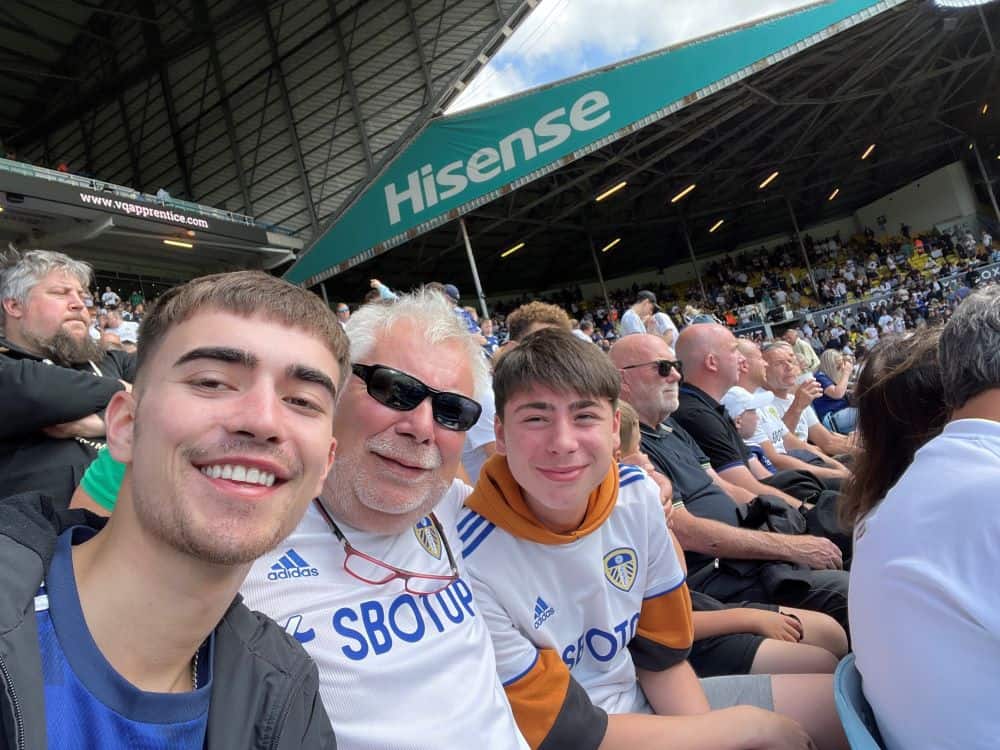There aren’t many things more important to me than my beloved Leeds United.
My family, including my wife, Debbie, and sons Robbie and Ted is a given.
And then there’s the NHS – this remarkable organisation I have been blessed to have been a part of for 50 years and counting.

A bit like the fluctuating fortunes of Leeds since my first game at Elland Road in January 1965, the NHS has certainly had its fair share of peaks and troughs over the last 75 years.
And like football and our dyed-in-the-wool, hell-or-high-water association with a particular football club, our nation by and large continues to back its NHS, supporting their team of 1.5 million ‘players’ who strive every day to keep people well and treat people when they’re poorly.
Never was this more apparent and visible than at the height of the COVID pandemic when people stood on their doorsteps, applauding and banging their pots and pans in appreciation of the NHS and its workforce, unfettered by Government mood music, just an outpouring of empathy and gratitude.
Since my first day in the NHS, as a trainee at the old Batley and District General Hospital in West Yorkshire in 1973, I’ve always appreciated the public sentiment around the NHS and its cherished position as a national treasure of our society. But rarely have I seen a bigger display of public affection than during those very dark days of the pandemic.
The NHS matters. And it’s why it’s entirely appropriate we take a moment to celebrate the organisation’s 75th birthday and its achievements – and reaffirm our commitment to ensure it’s fit for the next 75 years.
I’m extremely proud that its founding principles remain largely intact: a health service available to all, free at point-of-need, with provision of services based on a person’s clinical need, not on an individual’s ability to pay.
Sometimes it’s worth reminding ourselves of The NHS Constitution for England – “The NHS belongs to the people”.
It continues: “It is there to improve our health and wellbeing, supporting us to keep mentally and physically well, to get better when we are ill and, when we cannot fully recover, to stay as well as we can to the end of our lives.
“It works at the limits of science – bringing the highest levels of human knowledge and skill to save lives and improve health. It touches our lives at times of basic human need, when care and compassion are what matter most.
“The NHS is founded on a common set of principles and values that bind together the communities and people it serves – patients and public – and the staff who work for it.”
Those of us who are fortunate enough to hold leadership positions within the NHS largely share these sentiments.
At the same time, we understand the challenges faced by the NHS – staff retention and recruitment, financial, population health, narrowing the gap in health inequalities, hospital waiting lists, access to Primary Care, how fast and how far we embrace artificial intelligence – to name but a few.
As we look to the future, aside from continuous advances in medicines and treatments, I also believe the NHS must continue to evolve to be more of an influencer in the whole prevention agenda. And by that I mean being more vocal in encouraging people to make more positive lifestyle choices to reduce their own risk of poor health, rather than just being an organisation that fixes people when they’re unwell.
It doesn’t sit well with me that in our own ICS there are 10 to 15 year gaps in average life expectancies depending on the postcode people are born into. And there are parts of Humber and North Yorkshire that are outliers in terms of obesity, heart disease, smoking rates, premature births, teenage pregnancies.
There isn’t a single magic bullet that will suddenly make those disparities vanish overnight, but this is my North Star and where I think the NHS in our region, together with our Partners, can come together to create a critical mass and have a real and tangible impact on people and communities.
As I reflect on my own 50-year career in the NHS – and how proud I am to be among the “playing squad” in this incredible organisation – I’d just like to throw in another football metaphor that’s often used by managers and owners alike: I am just a custodian of the NHS (one of many, I hasten to add).
When I step away, I want to be able to hand over the reins, knowing the organisation is in a better place than when I joined, both in terms of its structures and the outcomes it delivers.
Away from the NHS, my other wish is for Leeds United to be back in the Premier League. I’d settle for the former.
